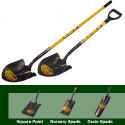 2/
Gardening Encyclopedia 2/
Gardening Encyclopedia
A good gardening encyclopedia is a must. There's always
something that you want to do or have come across that you know little
or nothing about. Even experts need a reference every now and then.
The AHS Encyclopedia of Gardening (Hardcover - 648 pages) is
a comprehensive guide to most things that you could ever
want to do in the garden. Stacks of information, plentifully illustrated
and well set out in logical sections. A comprehensive reference guide
for the beginner and expert alike. If you only buy one gardening book
it has to be this one.
Review
|
 3/
Vegetable Gardeners Bible 3/
Vegetable Gardeners Bible
The Vegetable Gardener's
Bible: Discover Ed's High-Yield W-O-R-D System for All North American
Gardening Regions.
A well thought out and invaluable book
for anyone who wants to grow vegetables. Sort of like an idiots guide
but without being patronizing and plenty of stuff for the more advanced
gardener too. Not just a collection of hints and tips but, explanations
of the principles behind gardening - understand those and you need to
remember much less!
|
 4/
Plants book 4/
Plants book
You wouldn't be a gardener if you didn't like plants
and so the chances are that you've already got one or two at least on
your favourite groups. As you get more serious, you want to know more
and more and so need a more comprehensive book. The
AHS New Encyclopedia of Plants and Flowers (Hardcover
- 720 pages) is the ideal solution.
A very useful descriptive guide to thousands of garden
plants, lavishly illustrated. Set out into trees / shrubs / perennials
etc. and sub-divided into colors and seasons of interest.
Review
For the real enthusiast, the big brother volume is
the
AHS A-Z garden plants (Hardcover - 1092 pages)
|
   5/
Gardening gloves 5/
Gardening glovesProtection from twigs, spikes, thorns or even the
soil (my hands get very dried out by clay soils after relatively little
contact) is a necessity if you're gardening for any length of time.
Gloves are a great boon to keeping comfortable and scratch-free when
doing all sorts of jobs in the garden, so make sure you get a decent
pair.
|
 6/
Top Quality Spade 6/
Top Quality SpadeA good spade is the basic essential garden tool. I
always try to use a spade whenever possible rather than a trowel even.
The fact that it moves more soil means more mixing, more aeration and
encourages me to add more compost or other soil improver to whatever
job I'm doing. A good professional quality spade not only makes digging
jobs less heavy or tiring, they're also just nice to use.
|
|
 7/
Compost heap and Compost tumbler 7/
Compost heap and Compost tumbler
You can't call yourself a proper gardener unless you
make garden compost. It's the perfect way to recycle all of those nutrients
that your plants pull out of the soil within the confines of your own
garden. Garden compost is a fabulous soil conditioner and much more
environmentally friendly than driving off with clippings to the tip
and then picking a bag of a bit of a peat bog at the garden centre to
replace it with. If you're serious about making compost, than a good
tumbler improves your performance tremendously and speeds up the process
greatly.
|
 8/
String 8/
String
There are always things to be tied up and held together
in the garden and string is just the stuff for the job. Maybe it's not
as quick as tape in a dispenser or as strong as modern alternatives,
but a faintly hairy, satisfyingly plump and heavy ball of string is
versatile, cheap and comfortingly traditional low tech answer to dozens
of odd jobs.
|
  9/
Footwear 9/
FootwearPutting on a comfortable pair of
gardening shoes, boots, clogs or whatever your preference is like a
statement of intent, "I'm going to start gardening now". I also think
it's a luxury to be able to leave them in the corner of the shed
or garage with a thick woolly pair of over-socks stuffed into them and
just slip them on whenever I want to go and do a quick spot of digging.
No worries about getting them dirty and no having to clean them when
I've done. Just wander out to the garage, slippers off boots on and
I'm away, anywhere between 5 minutes and 5 hours later and reverse the
process. They're part of the whole gardening experience.
|
 10/
Loppers 10/
LoppersWhen your garden gets more mature and established
(or if it's there already) the plants will grow thicker and faster than
ever. The easiest way to keep them under control is with a pair of loppers,
sort of super-secateurs on a stick so you can put more effort into cutting
thicker branches. Loppers are ideal where secateurs can't cope and much
better than a saw for springy braches as you can choose the branch you
want to cut and remove it surgically in a single "snip" with no springing
about or bashing all of the adjacent branches.
|